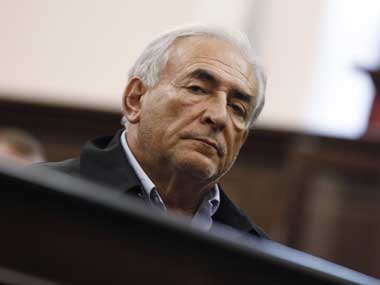I was being only halfways polemical yesterday when I pitched for RBI Governor D Subbarao to be made the IMF chief following the disgraceful (near-certain) end to Dominique Strauss-Kahn’s stewardship of the organisation.
But I gather from some of the responses that there are many who think the notion that a non-European would ever head the organisation is disingenuous.
That’s an entirely erroneous understanding of how the world is evolving.
Yes, I know how the old order works. The rich countries got the top jobs, and us poor countries got shafted. Under that old Bretton Woods arrangement, the US and the Europe pretty much carved up the world and played monopoly. An American has traditionally headed the World Bank whereas the IMF has always had an European on top.
[caption id=“attachment_11105” align=“alignleft” width=“380” caption=“With the arrest of Dominique Strauss-Kahn it will now be difficult for the Europeans to claim that they have a natural right to run this institution. Shannon Stapleton /Reuters”]
 [/caption]
[/caption]
Even today, with the hunt for Strauss-Kahn’s successor already under way, leaders in Europe are marking the territory as only fit for a European. (see Update below)
But as Edward Hadas of the Financial Times, explains :
“This will be a turning point in the history of the IMF: European predominance, European leadership and European centre of interest will be marked as having come to an end. The power structure of the world has changed.”
Hadas emphasises that while some of this relates to the IMF’s momentary “embarrassment” over circumstances surrounding the arrest of Strauss-Kahn, that ties in with longer-term trends which are reshaping the world. “It will be very difficult for the Europeans to now claim that they have a natural right to run this institution.”
Impact Shorts
More ShortsSo if India - or any other emerging economy - did make a pitch for the top job, the chances of getting our man in at the door aren’t as outlandish as might have appeared even three days ago. Certainly not a done deal, but not a fantasy either.
The lack of unanimity among emerging countries is still a hurdle. There could be some opposition or competition from China to an Indian candidate, partly because China looks to leverage a seat at the high table for political gain - as it did when it used its clout at the ADB to block a loan to India that was to be used in Arunachal Pradesh.
But in the event that India does decide to put up a candidate, who might it be? I still hold that Subbarao is a great candidate. Previous rounds of iteration have thrown up the names of Planning Commission Deputy Chairman Montek Singh Ahluwalia, but more recent speculation appears to revolve around Central Bank of India chairman S Sridhar .
Then there’s Subbarao’s predecessor at the RBI, YV Reddy, the man widely credited with having steered the ship of the Indian economy through the troubled waters of the 2008 global financial crisis. Reddy too commands immaculate authority in global financial circles.
All this is not to say that the power balance at the IMF, which reflects a 1940s world, will shift overnight. But know this: the old order that determined the relationship between ‘us’ and ’them’ is well and truly dead.
--
UPDATE: Wall Street Journal commentator Paul Hanlon makes what is perhaps the most persuasive case for why Europe, staring at a debt default in the periphery states, should not have a European as the IMF head.
“The last place the new head of the IMF should come from is Europe, precisely because Europe is the part of the global economy that’s in the biggest mess.
“When Asia was experiencing its own financial crisis in the late 1990s, European leaders didn’t suggest someone from Indonesia, the Philippines or Thailand would therefore be best-placed to run the IMF. And when Latin America was experiencing its sovereign debt crisis in the 1980s, Europe was content to see a succession of French bureaucrats run the fund. Back then, empathy and pliability weren’t the main qualifications for the job. Indeed, a tough, unflinching insistence on doing the right thing was considered a prerequisite, at least when other people-or rather, other political leaders-were going to feel the pain.
“It’s time for Europe to accept the rules as they are written, and not as they can be negotiated and fudged.”
Venky Vembu attained his first Fifteen Minutes of Fame in 1984, on the threshold of his career, when paparazzi pictures of him with Maneka Gandhi were splashed in the world media under the mischievous tag ‘International Affairs’. But that’s a story he’s saving up for his memoirs… Over 25 years, Venky worked in The Indian Express, Frontline newsmagazine, Outlook Money and DNA, before joining FirstPost ahead of its launch. Additionally, he has been published, at various times, in, among other publications, The Times of India, Hindustan Times, Outlook, and Outlook Traveller.
)